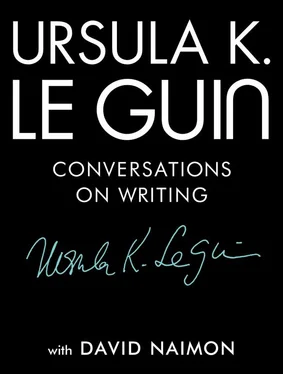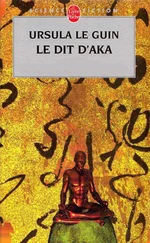UKL:Yes, that’s fairly Taoistic. That is wu wei , or doing by not doing. It seems very passive. Of course, Lao Tzu strikes the Western conflict-oriented mind as incredibly passive. “Don’t do something, just sit there.” That’s where he is so tricky and so useful. There are many different ways of just sitting there.
DN:In Steering the Craft , you include exercises with each chapter. Do you have a favorite? Or one that writers find particularly useful/challenging?
UKL:As I say in the book, “Chastity” was one I invented when I was fourteen, when I realized that my attempts to write stories weren’t exactly flowery, but had too many words, too many adjectives and adverbs. So I deliberately tried to write a whole page of narrative without any adjectives or adverbs at all. It gets very tough, because essential words like “only” and “then” are adverbial. So sometimes you can’t cut them all out. But you can certainly cut out all the “-ly” words, and all the rich juicy adjectives. You end up with a chaste, plain piece of prose. And because you have to put all that energy into the verbs and the nouns instead, it is stronger and richer. “Chastity” is an exercise I’ve used in almost every workshop I’ve ever taught. And people hate it! But they don’t hate it as bad as the last exercise, “A Terrible Thing to Do,” where you take a piece of your own writing and cut it in half, saying the same things in half as many words.
DN:You mentioned that you recently started an online engagement with aspiring writers. I wonder if your own personal biography might also be a source of inspiration for people trying to find their feet as writers. It took you quite a while, of writing and submitting, before you saw any tangible success. Can you talk about that period, how long it was, what you were doing, etc.?
UKL:In doing this workshop it seems to be useful for me, now at the end of my career, to tell people some of what I went through. It feels sort of egoistic, but it may be of some real interest and value to them to know of the setbacks and awful self-doubts that I think most writers go through. More than most artists, maybe because they work so much in solitude, writers tend to self-doubt. And getting published is a formidable barrier. Starting out, I was able to place a poem every now and then—in one of the little tiny poetry magazines—eight or nine readers—but at least I was in print. But I couldn’t sell any fiction. For six or seven years I was methodically writing short stories and novels, trying to place them, and getting nowhere. Got lots of nice rejection slips.
The fact is, I was committed to being a writer, to my writing, and I had a self-confidence or arrogance that carried me through. “I am going to do it, and I’m going to do it my way.” I stuck to that. And bang, I finally broke through. I sold two stories in one week, one to a commercial magazine and one to a little literary magazine. Once the door cracks open, it seems to stay open. It’s easier to know where to submit your work. My stories often weren’t conventionally realistic, but had some nonrealistic twist, and I realized that fantasy and science fiction magazines could read them and not say, “What is this?” There was an open mind there that I hadn’t met in the conventional markets. After this breakthrough, slowly but fairly steadily, I began to get the breaks.
Of course, until I had an agent, I faithfully submitted my work, which is hard work.
And this is the area I’m not sure I know how to talk about now—it’s so different, with the internet, e-publication, self-publication. About self-publication, for instance, I can’t even say I’m of two minds. I’m just trying to figure out what it really involves and where it really gets you as a writer. If you self-publish without any network of publicity, any way to make your work known, and if you don’t choose to sell yourself to advertisers—? I just don’t know. I don’t know. It’s wonderful to see your work in print, goodness knows, but how much good is that if nobody’s reading it outside your peer group and your relatives? I don’t know. Nobody has much solid advice to give anybody at this point. We’re in a revolution. We can only try to figure out how publishing is going to settle down after the revolution. And it will.
Prior to my first interview with Ursula, my wife and I were planning a hiking trip to the North Cascades National Park along the border between Washington State and Canada. But wildfires, the new summer norm in the Pacific Northwest, had another idea, shutting down the park and sending us scrambling for last-minute alternatives. I knew of Ursula’s long-standing love of Steens Mountain in the remote high desert of the farthest corner of southeastern Oregon, a landscape that had informed the world of her novel The Tombs of Atuan , as well as her poetry-photography collaborative collection Out Here . Even though we had yet to meet, I decided to call her up and see if, by chance, she had any suggestions to save our vacation.
“Do you know about dark skies?” Ursula asked, clearly excited to share. “That this is one of the only places left in the United States where you can experience true darkness, see the stars as if under a sky with virtually no light pollution?” she continued, her voice full of the wonder of countless nights under that very sky.
Soon my wife and I found ourselves “out there,” in a town of fewer than twenty people, in a hotel run by fifth-generation Oregonians, in a region where wild horses still roamed under the brightest of dark skies. “Tell them Ursula and Charles sent you,” she told us, and we were taken in and cared for by the rare breed of people who lived out there, farmers and ranchers who could trace an unbroken lineage back to the first white settlers in the region. As my wife and I sat together beneath the “blazing silence,” “the endless abyss of light,” contemplating our place in the world, in the universe, we were, unbeknownst to us, learning about Ursula through these dark skies and the people they illuminated, long before Ursula and I were to meet face-to-face.
Now, when I think of Ursula’s poetry it’s this, these unadulterated skies and the people who generation after generation have lived beneath them, I think of most. If imagination is the word that comes first to mind about her fiction, contemplation is the word I’d most associate with her poetry. She does not write science fiction poems, poems taking place in imagined other worlds, but rather contemplates our place in this one. If one removes human light from the sky, allowing it to become again “eternity made visible,” if one spends time in a land where antelope, coyote, pelicans, and raptors far outnumber human souls, certain questions of meaning inevitably arise. What does true fellowship with the nonhuman other—animals, birds, plants, the land itself—look like? What human tools and technologies, stories and language, are worth passing on generation to generation? What is our proper relationship to mystery, to wonder, to what we don’t know, to what we can’t?
Ursula’s world is not a Manichean world, one where darkness and light are in opposition. “Yin and yang” can be translated as “dark-bright” and for Ursula, much like in the precepts of Taoism, these seeming opposites are actually one thing, inseparable, interconnected, and interdependent. The people of the world of Earthsea wrote and passed down many Taoist-like poem-songs, none older than the poem of their own creation myth. This culture chose to pass down this poem, generation after generation, to contemplate “dark-brightness” and their place within it. And Ursula, fittingly, chose an excerpt from it as the epigraph to the book that introduces their world to us, a world that still strove for harmony and balance with otherness:
Читать дальше









